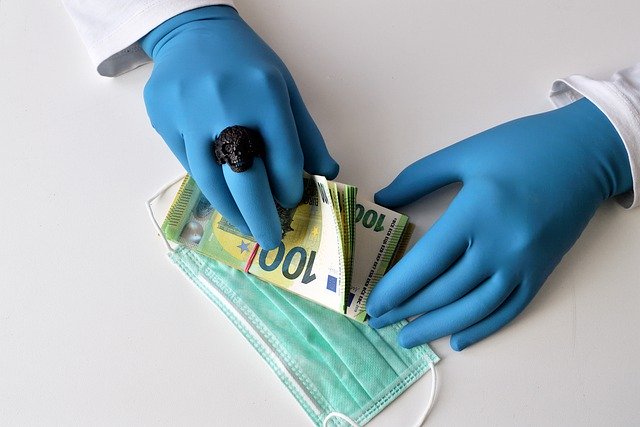In Africa, seemingly with blank cheque access, ‘Covidprenuers’, dubious politically-connected suppliers of goods and services, are plundering COVID-19 funds, depriving the threadbare public health system of basic resources to tackle the pandemic. This is increasing the risk of fatalities amongst the population. Doubtless, with increased accountability and transparency in procurement systems, the situation could have been different.
By Jimmy Swira
If reports of unabated, barefaced plunder of COVID-19 funds in African countries are anything to go, then it would not be alarmist to pronounce that a major health disaster awaits the majority of Africans, as a direct result of this malfeasance.
The ‘plundermic’ of misappropriating COVID-19 funds is rendering health systems vulnerable, ill-prepared to cope, according to Transparency International’s recent report. And this couldn’t have been unfolding at a worse time, against the backdrop of increasing burden of plateauing infections, rising fatalities and emergence of mutating variants of the Coronavirus, as health experts have warned.
Excruciatingly, reports are exposing deplorable misdeeds in government procurement processes of what are termed ‘Essential goods and services’ sanctioned under Emergency Procurement (Disaster Management). Unashamedly, procurement procedures are being flouted, as lucrative tenders are awarded to shell companies owned by ‘Covidprenuers’, politically-connected individuals with no track record, let alone accreditation in the supply of medical consumables. It is not a coincidence that some preferred suppliers are companies that were only established conveniently just soon after there was public knowledge about the pot of gold that is COVID-19 funds.
As if irregularities in the award of tenders are not enough, in some cases, goods and services are supplied at stratospherically inflated prices, at times thrice the market price as the BBC reported about the situation in South Africa. To add insult to injury, worryingly, the quality of the consumables does not comply with minimum standards.
What’s more, there have been cases of frivolous purchases. A case point is in South Africa’s Eastern Cape Province where scooters for supposed use by field health workers were procured. Only belatedly, a colossal cost later, it turned out that the scooters were not needed and had not been deemed essential.
Also, bizarrely, as it has been happening in Malawi, ‘strategic’ meetings are being organised in far-flung hotels and resorts to discuss ‘multi-sectoral’ approach to tacking COVID-19, while the convenience of Zoom and Microsoft Teams virtual platforms would have sufficed. This is also despite participants being cognizant of the fact that mingling in conferences increases one’s risk of COVID-19 infection. Unsurprisingly, it turns out the meetings are deliberately organised as a cash cow for public sector delegates to claim conference attendance allowances.
Ultimately, as you would have thought, a big chunk of the budget meant for procurement of goods and products is depleted or unaccounted for, while there is shortage or lack of the most basic of essential resources. This is the situation in Malawi, where the government of President Lazarus Chakwera cannot credibly explain depletion of US 37 million in COVID-19 kitty received from the World Bank . Frustrated by lack of accountability, an activist, on behalf of concerned citizens is suing the government. Malawi is one of the world’s poorest countries.
Appallingly, as a result of the abovementioned corrupt practices, in most countries on the continent, health systems are ill-equipped, threadbare to handle worsening conditions.
First, ludicrously, referral hospitals do not have ventilators for patients, and where they do have, the equipment would be obsolete or in a very poor working condition. Thus, it should not be surprising that there have been reports of fatalities due to insufficient supply of oxygen.
Secondly, there have been reports of potentially salvageable fatalities recorded due to lack of, or overwhelmed, manpower in some countries. Moreover, there have been reports of health facilities being overwhelmed by admissions, with no provision for additional space.
Granted, it would be hardly credible to express shock at misappropriation, as poor governance in post-colonial Africa is endemic. However, the indifference of countries to making a moral about-face on humanitarian grounds and handling the COVID-19, as a different kettle of fish, is to say the least, preposterous. This is given that at stake are hundreds of million lives.
One would have thought that, for once, in view of the severity of the pandemic, albeit transitorily, sanity would have prevailed, and the COVID-19 initiative, largely donor-funded in most low-income countries, would be spared from the ill-fated approach of other programmes.
Instead, the plundermic of corruption, courtesy of the dearth of transparency and accountability in the management of overstretched COVID-19 financial resources, has increased the risk of the pandemic claiming more lives. While the arrival of vaccines under COVAX programme may provide some sense of security, the jury is not yet out on whether the vaccines have efficacy in providing protection against mutating strains of the Coronavirus.

The whole system is a disaster. Africa needs a savior somehow
LikeLiked by 1 person
I hope this saviour won’t be overwhelmed western countries, whose resources are diverted towards addressing domestic problems
LikeLiked by 1 person
The plunder is everywhere and yet most African countries can’t even buy their own vaccine….. they’re waiting for donations 🙄
LikeLiked by 1 person
That’s correct. Sadly corruption seems to be very part of Africa’s fabric, mode of everyday life. And based on this, it
is very naïve to expect COVID-19 to usher in a new era.
LikeLike